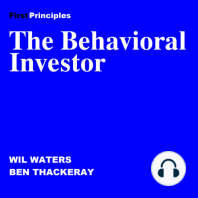40 min listen

S3E1 ? Behavioral Design in Fintech with Francesca Johnston
S3E1 ? Behavioral Design in Fintech with Francesca Johnston
ratings:
Length:
37 minutes
Released:
May 29, 2021
Format:
Podcast episode
Description
Francesca Johnston (https://twitter.com/FrancescaChess) is a behavioral science master’s student at the London School of Economics. We talked applications of behavioral design to fintech.
The premise of latest book by Dr Grace Lawden from LSE was hyperbolic discounting: https://www.amazon.co.uk/Think-Big-Small-Steps-Future/dp/0241420164/ref=sr_1_1?dchild=1&keywords=grace+lordan&qid=1622051681&s=books&sr=1-1. This author states that the most effective behavior change means is medium term, not long term: 5 years.
Fintech BD exmples:
Episodic future thinking by NatWest: contrasting yesterday, today and tomorrow’s versions of the self: https://www.moreaboutadvertising.com/2021/03/natwest-strikes-an-optimistic-note-with-thepartnerships-new-tomorrow-begins-today-line/. Aged images of your future self helps to reduce the effect of delayed/hyperbolic discounting: https://www.ncbi.nlm.nih.gov/pmc/articles/PMC3949005/.
Monzo: Designing good mental health into the way we bank: https://www.designcouncil.org.uk/news-opinion/monzo-designing-good-mental-health-way-we-bank.
Plum: an app for your financial health and wellbeing: https://withplum.com/.
Effects:
Prospect theory is composed of loss aversion, anchoring and the probability effect: https://en.wikipedia.org/wiki/Prospect_theory. It is about how humans make decisions where there is a degree of uncertainty, such as investing.
Memories are built based on our biases, they can be distorted by: duration, neglect, forecasting bias, spotlight effect (https://thedecisionlab.com/biases/spotlight-effect/).
Peak-end effect: https://en.wikipedia.org/wiki/Peak%E2%80%93end_rule.
Loss aversion: https://en.wikipedia.org/wiki/Loss_aversion.
Anchoring: https://en.wikipedia.org/wiki/Anchoring_(cognitive_bias).
Losses are felt twice as much as equivalent gains: https://milfordasset.com/insights/investors-feel-losses-twice-much-gains.
Lunch effect: judges just before lunch sentence more people: https://www.nytimes.com/2011/08/21/magazine/do-you-suffer-from-decision-fatigue.html.
---
Send in a voice message: https://anchor.fm/the-behavioral-investor/message
The premise of latest book by Dr Grace Lawden from LSE was hyperbolic discounting: https://www.amazon.co.uk/Think-Big-Small-Steps-Future/dp/0241420164/ref=sr_1_1?dchild=1&keywords=grace+lordan&qid=1622051681&s=books&sr=1-1. This author states that the most effective behavior change means is medium term, not long term: 5 years.
Fintech BD exmples:
Episodic future thinking by NatWest: contrasting yesterday, today and tomorrow’s versions of the self: https://www.moreaboutadvertising.com/2021/03/natwest-strikes-an-optimistic-note-with-thepartnerships-new-tomorrow-begins-today-line/. Aged images of your future self helps to reduce the effect of delayed/hyperbolic discounting: https://www.ncbi.nlm.nih.gov/pmc/articles/PMC3949005/.
Monzo: Designing good mental health into the way we bank: https://www.designcouncil.org.uk/news-opinion/monzo-designing-good-mental-health-way-we-bank.
Plum: an app for your financial health and wellbeing: https://withplum.com/.
Effects:
Prospect theory is composed of loss aversion, anchoring and the probability effect: https://en.wikipedia.org/wiki/Prospect_theory. It is about how humans make decisions where there is a degree of uncertainty, such as investing.
Memories are built based on our biases, they can be distorted by: duration, neglect, forecasting bias, spotlight effect (https://thedecisionlab.com/biases/spotlight-effect/).
Peak-end effect: https://en.wikipedia.org/wiki/Peak%E2%80%93end_rule.
Loss aversion: https://en.wikipedia.org/wiki/Loss_aversion.
Anchoring: https://en.wikipedia.org/wiki/Anchoring_(cognitive_bias).
Losses are felt twice as much as equivalent gains: https://milfordasset.com/insights/investors-feel-losses-twice-much-gains.
Lunch effect: judges just before lunch sentence more people: https://www.nytimes.com/2011/08/21/magazine/do-you-suffer-from-decision-fatigue.html.
---
Send in a voice message: https://anchor.fm/the-behavioral-investor/message
Released:
May 29, 2021
Format:
Podcast episode
Titles in the series (27)
S1E2 What a Psychologist Says About Hacking the Dopamine Reinforcement System to Compound Your Way to $1B by The Behavioral Investor